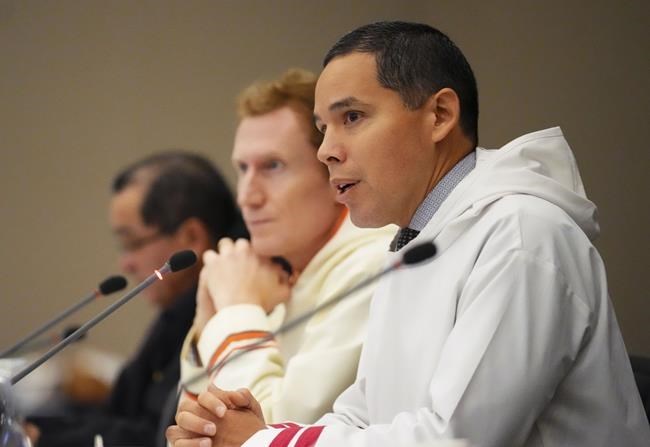OTTAWA ‚Äî Prominent Indigenous organizations are making major requests of the federal government in its upcoming budget, seeking billions in investments for infrastructure and economic development.¬Ý
But with affordability issues at the top of the agenda and Finance Minister Chrystia Freeland promising fiscal restraint, it's unclear where those requests will land on the Liberals' list of priorities.
In addition to offering relief to Canadians who are struggling with high prices, the budget is also expected to include money to advance Canada's green energy transition and keep the country competitive with the United States, which is aggressively funding clean technology with its Inflation Reduction Act. ¬Ý
So, where does that leave the federal government's commitment to reconciliation?¬Ý
Inuit Tapiriit Kanatami President Natan Obed says that despite the government's talk of restraint, it will still be spending billions ‚Äî and he hopes that includes a 35-year, $75-billion commitment for infrastructure in Inuit communities.¬Ý
"There is going to be money spent in this budget, so as this government is talking about this –°¿∂ ”∆µ a very lean budget, there will still be billions of dollars," he said in a recent interview.¬Ý
"I certainly hope that the work that we have all done together is funded in a way that is consistent with the relationship that we've built over the past seven and a half years."
Obed said the requests included in the organization's pre-budget submission came out of discussions with Prime Minister Justin Trudeau's government at the Inuit Crown-partnership committee table.
"It isn't just us bringing numbers out of thin air," he said. The organization also requested about $131 million over seven years with the goal of eliminating tuberculosis in Inuit regions by 2030.¬Ý
Obed said Trudeau's government has committed to that timeline, but hasn't shown how it will achieve the goal.¬Ý
"We have no guarantees that (the) government of Canada will fund the remaining work that is necessary to eliminate tuberculosis," he said.
Trudeau has named advancing reconciliation with Indigenous Peoples as one of his government's main priorities since it came to power in 2015.¬Ý
Last year's budget, however, fell short of expectations when it came to improving and building more housing on First Nations, which has been long identified as an issue for many communities across Canada.¬Ý
Indigenous communities face a deteriorated housing stock, and leaders and experts have said there is not enough available to support population growth.¬Ý
Ahead of the 2022 federal budget, the Assembly of First Nations ‚Äî which advocates for the needs of more than 600 First Nations communities ‚Äî pegged that $44 billion was needed to fix on-reserve housing.¬Ý
Ottawa ended up committing $4.3 billion to support housing in Indigenous communities over seven years, with $2.4 billion flowing specifically to on-reserve housing needs.¬Ý
For the upcoming budget, the assembly anticipates that meeting the "current and future housing needs of First Nations" through to 2040 accounting for population group would cost around $63.3 billion, according to a submission prepared ahead of the spending plan.
It says such spending is needed "to address the ¬Ýoverrepresentation of First Nations people among those experiencing homelessness."
For her part, M√©tis National Council President Cassidy Caron said in a statement that she hopes the next budget includes funding for the organization to create an economic development fund specifically targeted to help M√©tis businesses.¬Ý
In its submission to the federal government, the organization says M√©tis communities are unable to access funds through two existing programs that Indigenous Services Canada runs to support economic development.¬Ý
It also recommends that the federal government provide funding to help create Métis business directories.
"Long-term, sustainable investments will help our citizens, communities and businesses weather current and future challenges," Caron said.¬Ý
The federal government had also signalled in its fall economic statement that it planned to develop a new framework to "ensure" that First Nations and other Indigenous communities "can directly benefit from major resource projects" developed on their lands, with more details to be provided this year.¬Ý
A presentation prepared by the Assembly of First Nations for its special chiefs assembly last December shows it was anticipating seeing some policy options on the matter in early 2023 and then finalizing a framework sometime between April and December.¬Ý
Native Women's Association of Canada CEO Lynne Groulx said that besides an ask for more stable federal funding, the group hopes that Ottawa's budget will fund at least two new healing lodges, which she said provide safe spaces for Indigenous women and survivors of residential schools.¬Ý
Groulx said a lodge can range in cost from $3 million to $5 million. She added that funding such projects directly relates to the government's commitment to implement the calls to action from the 2019 final report of the National Inquiry into Murdered and Missing Indigenous Women and Girls.¬Ý
"I think we need as many of these healing centres, gathering centres ... as we had residential schools," she said.
This report by The Canadian Press was first publishedMarch 27, 2023.¬Ý
Stephanie Taylor, The Canadian Press




